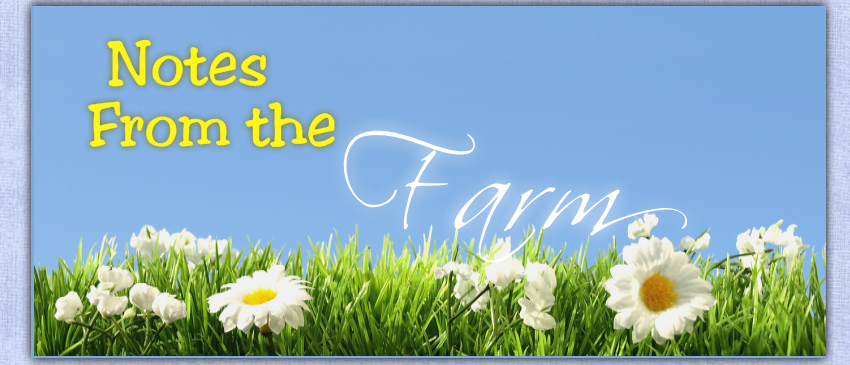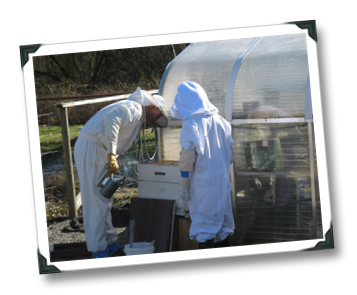Well, there's bad news on the bee front... You may remember that we have three bee hives. Two brand new ones, and one established one that we inherited from Derek's Grandpa. When we checked on the established hive this week, there was...nothing. No bees at ALL. It was like a ghost town. This is very strange considering that the hive was flourishing just last week.
The colony just up and left. For no apparent reason! It was healthy and thriving one week, and COMPLETELY GONE the next. We were shocked!!
My husband called his 'bee buddies' - friends of his that have been in the beekeeping business for a long time. They talked to him and took a look, and they've decided that these bees are a victim of Colony Collapse Disorder. "Colony Collapse Disorder (or CCD) is a poorly understood phenomenon in which worker bees from a beehive or Western honey bee colony abruptly disappear." The Burt's Bee's website sites, "The bee disappearance is so widespread that it is blamed for losses of up to 70% of the managed bee colonies in U.S. beekeeping operations." "While the causes for Colony Collapse Disorder are unknown, we do know that forces like habitat destruction, misuse of pesticides, invasive species and global warming create risks to honeybees."
And the Burt's Bee's website goes on to say, "Did you know that every third bite of food we eat depends on bees for pollination? You might not have given much thought to the role honeybees play in our ecosystem. But fact is, 30% of the fruit- and vegetable-producing plants we rely on to feed our families need honeybee pollination to thrive. That’s why the mysterious disappearance of honeybees known as Colony Collapse Disorder is a critical environmental issue that must be understood and reversed for The Greater Good."
Wow. This is a big deal. We need to save our bees! Because by saving bees, we're doing a lot more than JUST saving bees.
So what can we do?
- Educate yourself! Visit these sites for more information:
Burt's Bees
American Beekeeping Federation
North American Pollinator Protection Campaign - Plant bee-friendly plants in your yard! This will help attract native bee populations. Get free seeds here.
- Donate to help find a solution to Colony Collapse Disorder. Penn State is conducting research in this field, as well as UC Davis.
- Support local beekeepers! No one is more affected by this crisis than local beekeepers. Buy local honey and hive products.
- Support local farmers. "Because organic farms grow fruits and vegetables without pesticides, they are naturally bee-friendly places that actually need bees to grow their crops." Learn more here.
I'll keep you posted about this sad turn of events. My husband is actually at a class about Colony Collapse Disorder tonight. I just hope we can hang onto our other two hives...
"If the bee disappeared off the surface of the globe then man would only have four years of life left. No more bees, no more pollination, no more plants, no more animals, no more man." ~ Albert Einstein.











3 comments:
Di, I have actually been reading and listening on the radio to this bee problem. I was actually wondering if you were starting your hives to balance that out? Or if you were taking a chance you would lose your bees. I have been so interested, but not as emotionally involved as I am now after following your writing. This is such a good thing for you to do. Educate us.
I'll be back in the morning to read and digest everything better.
I hope you're feeling better.
Hugs, Mary
i've been reading up on this. i remember hearing about it for the first time last summer. not good...
I am sad to hear this - and this very morning was listening to a report on Fox News about it. I had never heard of the disorder before that report. I immediately thought of you and the good start your new hives are off to - and now I come here and learn one of the hives is gone. :( I hope the other hives will flourish.
It's really amazing, the delicate balance and interdependence of ALL living things. God is a wonderful designer!
Keep on keeping on!
Lynn
Post a Comment